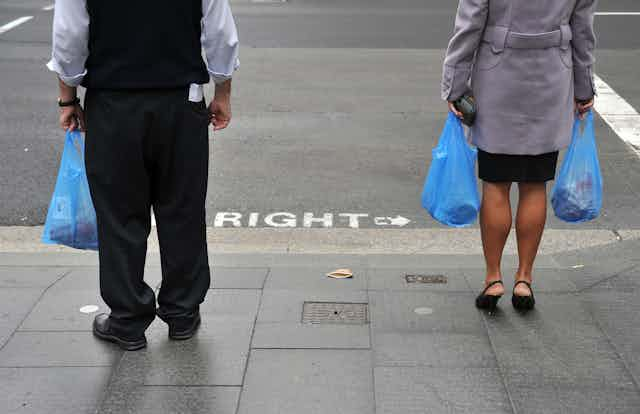Moves by major supermarkets to stop providing free plastic bags could earn these businesses more than A$1 million a year, but may only have a small impact on the environment.
Australia’s two supermarket giants, Woolworths and Coles, have announced that their stores will stop offering their regular plastic bags within 12 months. Instead, customers will be able to buy a more durable plastic bag at 15 cents apiece, or simply bring their own.
These bags are factored into the cost of doing business for these supermarkets. There are costs beyond just the bags themselves, such as the costs associated with sourcing and negotiating with packaging suppliers, procuring them, shipping and warehousing them, and distributing them to stores only to then give them away.
Supermarket margins are already feeling the strain of price deflation. These businesses are generally making less than 6c in the dollar, so the opportunity to phase out this cost certainly makes good business sense. The table below provides an estimate of current costs.
Estimated current costs
While retailers stand to pocket this saving, the switch to stronger, multi-use plastic bag brings with it its own costs. To begin with, the bags alone cost more (9c each) and also have associated procurement costs.
However, the new scheme will immediately reduce customers’ bag usage. Being optimistic, it would be reasonable to see an 80% decline in plastic bag use as shoppers actively search for alternatives to free bags.
Most shoppers will probably reuse the 15c bag, or look to other options like canvas bags, polyethylene bags or cardboard boxes. In turn, while the new re-usable bag may cost more than the thinner single-use bag, fewer will be used and therefore ordered. Retailers can expect to see a reduction in these packaging costs.
Estimated costs under new scheme
It’s estimated that Australian retailers give away 6 billion plastic bags each year. Woolworths alone say they provide 3.2 billion each year. Coles has not provided an estimate of bag use, but claim to process 21 million transactions each week. With fewer stores than Woolworths, I estimate that Coles may give away up to 2.7 billion bags annually.
With each bag costing almost 3c, retailers stand to save more than A$170 million a year in direct costs. Selling these new bags at 15c each effectively creates another revenue stream potentially adding up to A$71 million in gross profit (6c x 1.18 billion units).
It might not actually reduce bags
In 2013, Target reverted back to providing free plastic bags after three years of charging 10c per bag. Other than hardware retailer Bunnings, no other large retailer has initiated a voluntary ban on single-use plastic bags.
Some Australian state and federal governments have been pushing for single-use plastic bag ban for almost 10 years. South Australia was the first to ban plastic bags from supermarkets in 2009, followed by the ACT in 2010, Northern Territory in 2011 and Tasmania in 2012.
In 2016 the Queensland Government released a discussion paper on the proposed ban. It is predicted all states will fall into line by mid-2018.
The past impact of applying a charge to the use of plastic bags has provided positive, but mixed results. In Australia, Bunnings reported an 80% reduction after implementing a charge for plastic bags, while a 2008 trial undertaken in three Victorian regional towns by Coles, Woolworths and IGA resulted in a 79% reduction.
In 2002, Ireland applied a 15 pence (22c) charge to single-use plastic bags, claiming a 90% reduction within 6 months (this was before the transition to the euro currency in the same year). Then in 2007 it increased the charge to 22 euro cents (32c) in response to increased bag usage. Sadly, shoppers had become conditioned to the 15p charge and returned to their old habits.
The UK government likewise reported an 85% reduction in single-use plastic bags in the first 6 months after a 5p charge (8c) was implemented in 2015. Similar results have been reported in the US, with a 94% reduction in Los Angeles County from the introduction of a charge for bags.
In the above cases (excluding Australian examples), single-use bags were still available, however a levy was applied, creating revenue for governments to channel back into environmental programs. This model is not the planned approach for Australia, were all single-use bags will be replaced with either the heavy duty (>35 micron, LDPE) option at 15c or the “green” polyethylene bag.
Charging for bags has minimal impact on the environment
Unfortunately, introducing a charge for bags doesn’t help the environment in isolation. While plastic bags represent only about 2% of landfill, there is certainly sufficient scientific evidence that plastic bags do present risks to marine life and clog waterways.
However, simply charging for a plastic bag, without directing these funds into environmental programs, does not necessarily resolve the problem. Shoppers slowly return to old habits, governments and retailers stop educating consumers and re-usable bags soon make their way into water ways and landfill.
Some shoppers simply forget to bring re-usable bags with them. The UK Department for Environment, Food and Rural Affairs found that the average UK household had 40 plastic bags stashed away around the home. Also a South Australian parliamentary review found that only about 30% of shoppers actually recycled their re-usable bags.
In the US, studies indicated 40% of shoppers continued to use disposable bags, despite a 5 cent levy.
Moving to a reusable option also doesn’t stop people discarding these new bags either. Another US study found many people still threw away reusable bags.
Ultimately, “banning the bag” is only the beginning. Retailers will need to remedy customer complaints as the phasing out of plastic bags begins.
Like UK retailers, Australian supermarkets could choose to funnel some of the profits derived from the 15c reusable bag into community programs or environmental groups. Australian governments will also need fund ongoing education campaigns to draw attention to bans, alternatives and outcomes.

